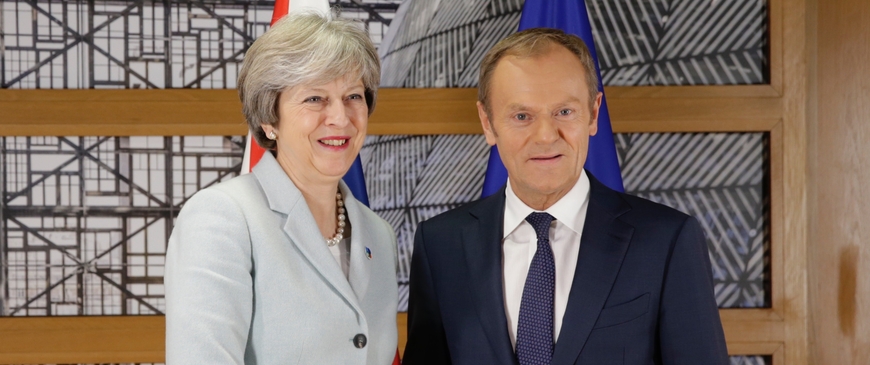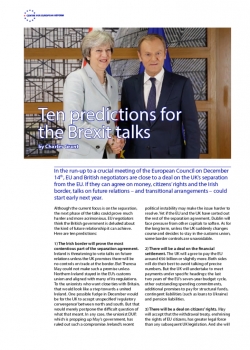
Ten predictions for the Brexit talks
In the run-up to a crucial meeting of the European Council on December 14th, EU and British negotiators are close to a deal on the UK’s separation from the EU. If they can agree on money, citizens’ rights and the Irish border, talks on future relations – and transitional arrangements – could start early next year.
Although the current focus is on the separation, the next phase of the talks could prove much harder and more acrimonious. EU negotiators think the British government is deluded about the kind of future relationship it can achieve. Here are ten predictions:
1) The Irish border will prove the most contentious part of the separation agreement. Ireland is threatening to veto talks on future relations unless the UK promises there will be no controls on trade at the border. But Theresa May could not make such a promise unless Northern Ireland stayed in the EU’s customs union and aligned with many of its regulations. To the unionists who want close ties with Britain, that would look like a step towards a united Ireland. One possible fudge in December would be for the UK to accept unspecified ‘regulatory convergence’ between north and south. But that would merely postpone the difficult question of what that meant. In any case, the unionist DUP, which is propping up May’s government, has ruled out such a compromise. Ireland’s recent political instability may make the issue harder to resolve. Yet if the EU and the UK have sorted out the rest of the separation agreement, Dublin will face pressure from other capitals to soften. As for the long term, unless the UK suddenly changes course and decides to stay in the customs union, some border controls are unavoidable.
2) There will be a deal on the financial settlement. The UK will agree to pay the EU around €50 billion or slightly more. Both sides will do their best to avoid talking of precise numbers. But the UK will undertake to meet payments under specific headings: the last two years of the EU’s seven-year budget cycle, other outstanding spending commitments, additional promises to pay for structural funds, contingent liabilities (such as loans to Ukraine) and pension liabilities.
3) There will be a deal on citizens’ rights. May will accept that the withdrawal treaty, enshrining the rights of EU citizens, has greater legal force than any subsequent UK legislation. And she will agree that UK courts may refer cases on rights to the European Court of Justice (ECJ).
4) The UK will agree to a transition on the EU’s terms. Britain will find the transition much like membership – with free movement, ECJ rulings and so on – except that it will be out of the EU’s institutions (and some of the EU’s free trade agreements with other countries). Businesses will probably have to wait until autumn 2018 to see the transition in a legally solid form, since it will form part of the overall separation agreement. The EU and the UK will both pretend that the transition will last for only about two years. In fact it will take much longer for the UK and its partners to build physical infrastructure at borders and for the Home Office to set up the IT systems for registering EU migrants. And it will take many years for the UK to sort out the future economic partnership. 10 Downing Street has been saying that this could be negotiated before Brexit, but the earliest that detailed trade talks will start – as opposed to talks on the framework for future relations, which will be part of the separation agreement – is early 2019.
5) The UK is likely to ask for a bespoke economic partnership. It wants a deal that provides better market access than the ‘Canada model’ (a free trade agreement or FTA with only limited provisions on services) but less than the ‘Norway model’ (fully in the single market). A system of ‘regulatory alignment’ is widely discussed in London: the UK would start off with the same rules as the EU in many sectors, with something close to single market membership, but accept that if its rules diverged it would lose access.
6) The EU will reject such a bespoke arrangement. It will insist that the UK choose from a menu limited to Norway, Canada or WTO rules. It will say the single market is a package – you are either in all or none of it – and that ‘cherry-picking’ in the sectors that matter to the UK, such as aviation or finance, is out of the question. The stance reflects, in part, the influence of governments like France and Germany, which have little desire to open their services markets to non-EU competition.
7) The best the UK can hope for is ‘Canada Plus’. May’s negotiators hope that the member-states most dependent on UK trade will push the Commission to offer the British a better deal than the Canadians, that is to say one with more on services. So far the EU shows few signs of softening. But if it did ever grant the UK anything close to single market membership in specific areas, it would demand cash payments, compliance with EU rules and ECJ rulings, and perhaps a liberal UK regime on migration. If all went smoothly, a generous offer from the UK on security and defence co-operation could encourage the EU to accept Canada Plus.
8) The EU’s top priority in the trade talks will be to prevent the UK undercutting its regulatory standards. It fears the UK will steal investment by eroding social, consumer or environmental standards, slashing corporate taxes or diverging from EU rules on state aid and competition. The EU will insist on provisions that allow it to punish the UK for any kind of ‘dumping’. Michel Barnier, the Commission’s negotiator, told a recent CER event that “the UK needs to decide if it is leaving the European regulatory model. The answer to this question is the key to the future relationship and to our ability to get an FTA ratified in the European and national parliaments.”
9) The City of London will be damaged. So far the British government has not made a priority of defending the City’s interests. It will probably do so eventually. Even so, UK-based firms will lose the right to ‘passport’ into the single market. As second best the City is hoping for a good deal on regulatory equivalence, but even that will be very hard to achieve and is likely to involve the UK being a rule-taker rather than a rule-maker.
10) In the end, some sort of trade agreement is likely. If it looked like the UK would crash out of the EU without an FTA – and without one, the separation agreement would unravel – the EU would face a major headache. Emmanuel Macron and Angela Merkel (if she survives) plan to spend next year redesigning the eurozone and EU defence co-operation. A messy Brexit would be an unwelcome distraction. So they would probably seek to intervene to broker a compromise. Furthermore, if the financial markets believed that the UK was going to leave without an agreement, they would panic. The pound would sink, business and consumer confidence would evaporate and investment would dry up. The British government would come under enormous pressure to return to Brussels to seek a compromise. Whatever they say in public, May and most of her ministers know that any deal, however bad, is better than no deal.
Charles Grant is director of the Centre for European Reform.
An earlier version of this article was published in The Guardian on November 9th 2017.


Comments